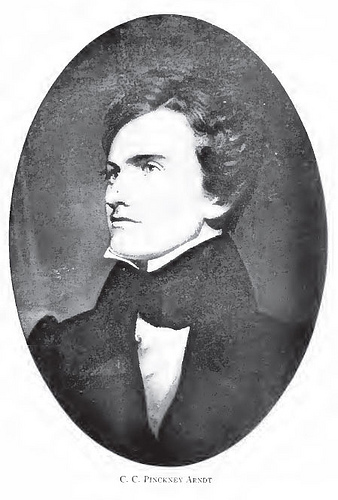Born in Wilkes-Barre, Pennsylvania, he came with his parents to Green Bay, Michigan Territory. Arndt graduated from Rutgers College, studied law in Easton, Pennsylvania and was admitted to the bar. In 1836, Arndt moved back to Green Bay and was admitted to the bar in Michigan Territory. Arndt was elected to the Wisconsin Territorial Council from Green Bay.
Died at 30 years of age; cause of death - gunshot. Charles Arndt was gunned down over an argument on the state assembly floor in Madison, Wisconsin.
On February 11, 1842 the Wisconsin Territorial Legislature met in Madison only to be interrupted by the shooting of one member by another. The legislature was debating the appointment of Enos S. Baker for sheriff of Grant County, one of the most important appointive county offices. Following a debate on the floor of the Council of the Legislative Assembly, Charles C.P. Arndt implied that fellow Council member James R. Vineyard, a personal friend of Baker, had made misstatements on Baker's behalf. After an uproar during which Vineyard denied Arndt's accusations, adjournment was declared.
In the moments following adjournment, Arndt approached Vineyard's desk on the floor of the assembly and the two continued their disagreement. As Arndt came closer to Vineyard he raised his hand and struck Vineyard in the head. Before any other legislator could intervene to separate the two men, Vineyard drew a pistol and shot Arndt in the chest. Arndt reeled backward and fell to the floor, dying where he had fallen about five minutes later.
Authorities quickly rushed Vineyard off to jail where he composed his resignation from the Council. The Council itself, however, refused to accept his resignation, instead voting to expel Vineyard as being unworthy to be a member of their body. After many judicial delays and a change of venue from Dane County to Vineyard's own district in Green County, he was tried and acquitted of manslaughter in October 1843.
In 1842, British author Charles Dickens wrote about the tragedy in his book "American Notes."
Born in Wilkes-Barre, Pennsylvania, he came with his parents to Green Bay, Michigan Territory. Arndt graduated from Rutgers College, studied law in Easton, Pennsylvania and was admitted to the bar. In 1836, Arndt moved back to Green Bay and was admitted to the bar in Michigan Territory. Arndt was elected to the Wisconsin Territorial Council from Green Bay.
Died at 30 years of age; cause of death - gunshot. Charles Arndt was gunned down over an argument on the state assembly floor in Madison, Wisconsin.
On February 11, 1842 the Wisconsin Territorial Legislature met in Madison only to be interrupted by the shooting of one member by another. The legislature was debating the appointment of Enos S. Baker for sheriff of Grant County, one of the most important appointive county offices. Following a debate on the floor of the Council of the Legislative Assembly, Charles C.P. Arndt implied that fellow Council member James R. Vineyard, a personal friend of Baker, had made misstatements on Baker's behalf. After an uproar during which Vineyard denied Arndt's accusations, adjournment was declared.
In the moments following adjournment, Arndt approached Vineyard's desk on the floor of the assembly and the two continued their disagreement. As Arndt came closer to Vineyard he raised his hand and struck Vineyard in the head. Before any other legislator could intervene to separate the two men, Vineyard drew a pistol and shot Arndt in the chest. Arndt reeled backward and fell to the floor, dying where he had fallen about five minutes later.
Authorities quickly rushed Vineyard off to jail where he composed his resignation from the Council. The Council itself, however, refused to accept his resignation, instead voting to expel Vineyard as being unworthy to be a member of their body. After many judicial delays and a change of venue from Dane County to Vineyard's own district in Green County, he was tried and acquitted of manslaughter in October 1843.
In 1842, British author Charles Dickens wrote about the tragedy in his book "American Notes."
Family Members
Advertisement
Records on Ancestry
Sponsored by Ancestry
Advertisement











